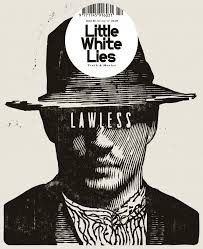 |
| Little White Lies magazine |
Little White Lies is a bi-monthly British independent movie magazine that's published by The Church of London.
The Church of London also publishes Huck which is another magazine that explores the many facets of radical culture.
What is the content of Little White Lies?
The magazine features a variety of things that appeal to their target demographic. It includes features such as:
- Film reviews
- Adverts
- Interviews
- Photography
It's split into six chapters: the lead review, an editorial introduction, a series of articles inspired by the feature film, theatrical reviews, the Back Section and future releases.
 |
| Inside spread of Little White Lies |
 |
| Inside spread of Little White Lies |
Who reads it?
Demographic audience:
The magazine ensures that the content appeals to their target audience, therefore they carefully consider what features in their magazine. Statistics from 2008 show that the magazine is popular with people aged from 25-35 (51%) that work in the Media industry (22%) and are mostly male (63%). It's clear that Little White Lies have constructed their magazine to appeal to these people.
Psychographic audience:
The people reading this magazine will have an interest in films and critics and will have their own opinion on their favourite films. Statistics from 2008 show that most people hardly went to the cinema, (72%), to see films due to the popularity with DVD's at the time which was before online streaming. The statistics also show that 93% of readers read the magazine from cover to cover and kept their copies after reading them.
Adverts
Some of the adverts appeal to the male demographic due to advertisements for beer and other male specified things. However, not all the adverts are targeted for males, some of them suggest that the magazine are targeting well-educated people of both sexes that are high class due to the feature of advertisements such as BBC Proms which would include high class/classical music and 1% for the Planet which would include environmental issues that caring higher class people would be usually concerned about. The cost of the magazine is now around £6 which also demonstrates the higher class demographic due to the expense of the magazine which lower class people wouldn't want to purchase because of how much it is; they would probably prefer a celebrity gossip magazine such as Heat magazine at a lower price of roughly £1.65.







No comments:
Post a Comment